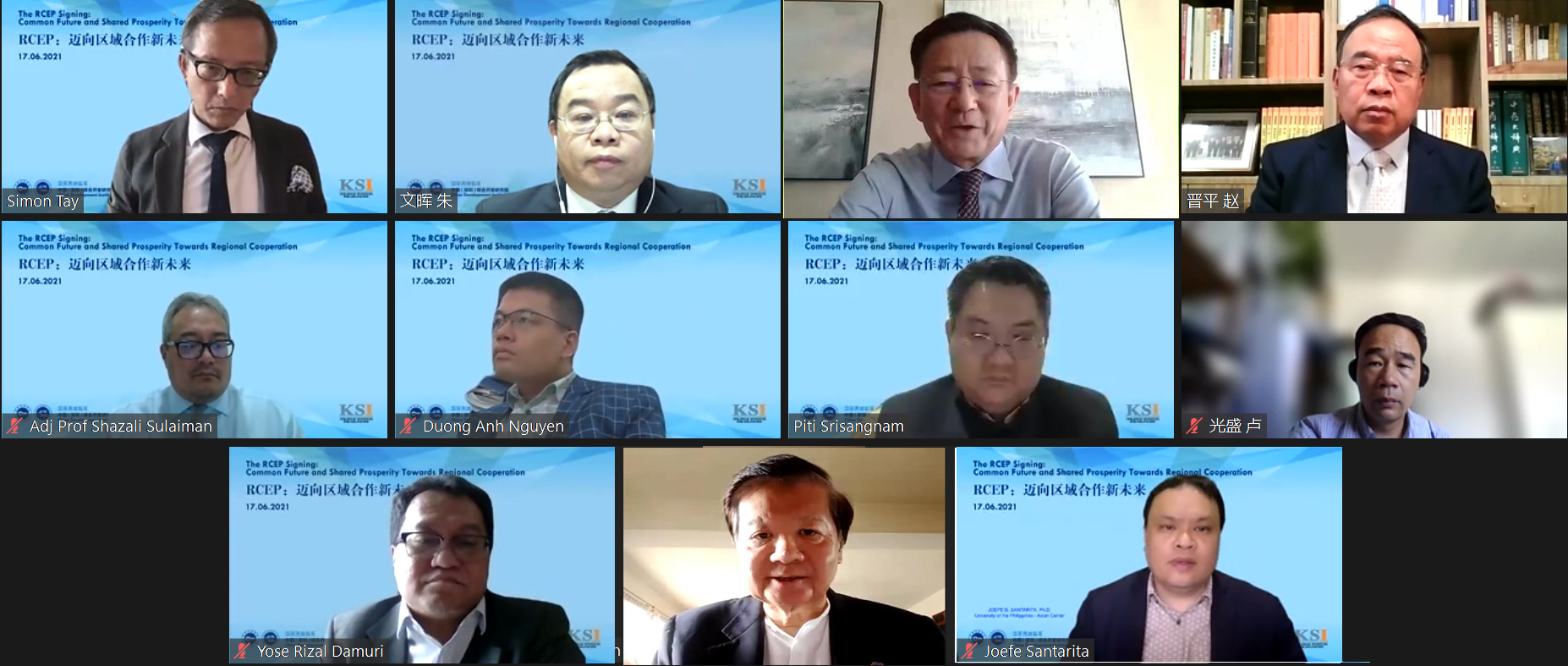Information

The year 2021 not only marks the 30th anniversary of China-ASEAN dialogue and relations, but also witnesses the steady progress of the Regional Comprehensive Economic Partnership (RCEP). Once implemented, the RCEP is expected to significantly eliminate tariffs between its signatory nations, and further promote regional value chains, trade, and intellectual property. The RCEP will help form a more secure and diversified supply chain, while facilitating closer regional economic and social connections.
On June 17th, China Development Institute and KSI Strategic Institute for Asia Pacific jointly held a webinar, bring together public representatives, academics, and professionals in the hope of providing insights into the next steps for regional economic cooperation and the RCEP’s complementary role to the Belt and Road Initiative (BRI).
Date: Thursday, 17 June 2021
Time: 14:30 (GMT+8)
Program
14:30-14:50 (GMT+8)
Opening Remarks
Moderator: Prof. Zhu Wenhui, Board Member of China Development Institute and Senior Commentator of Phoenix TV
Prof. Fan Gang, President of China Development Institute
Dr. Michael Yeoh, President of KSI Strategic Institute for Asia Pacific
14:50-15:55 (GMT+8)
Session 1 RCEP: Building Closer Regional Cooperation
Moderator: Prof. Zhu Wenhui, Board Member of China Development Institute and Senior Commentator of Phoenix TV
Speakers:
Dr. Zhao Jinping, Former Director-General of the Research Department of Foreign Economic Relations, Development Research Center of the State Council
Prof. Simon Tay, Chairman of Singapore Institute for International Affairs
Prof. Kriengsak Chareonwongsak, President of Institute of Future Studies for De-velopment; former Member of Parliament and Adviser to Prime Minister of Thailand
Mr. Nguyen Anh Duong, Director of Department for General Economic Issues and Integration Studies, Central Institute for Economic Management, Vietnam
Assoc. Prof. Piti Srisaengnam, Director for Academic Affairs, ASEAN Studies Center, Chulalongkorn University, Thailand
15:55-17:00 (GMT+8)
Session 2 Synergy of the RCEP and BRI: Prospect and Opportunities
Moderator: Dr. Michael Yeoh, President of KSI Strategic Institute for Asia Pacific
Speakers:
Dr. Yose Rizal Damuri, Head of the Department of Economics, Center for Strategic and International Studies, Indonesia
Prof. Joefe Santarita, Director of Asian Studies Center, University of the Philippines Diliman
Prof. Lu Guangsheng, Dean of Institute of International Relations, Yunnan Univer-sity
Adj. Prof. Shazali Sulaiman, School of Business and Economics, University Brunei Darussalam
Highlight
In his welcome speech, Fan Gang, President of China Development Institute (CDI), said that exchange and cooperation between China and ASEAN think tanks is one of the key aspects of regional cooperation strengthening. The diversity of RCEP members implies both a major challenge and an even greater opportunity for the promotion of regional connectivity. In-depth research and suggestion from think tanks of RCEP member nations is required to ensure that RCEP can truly facilitate the coping of global economic uncertainties and pandemic induced socio-economic problems.
RCEP: where it is now and the challenges ahead
Affected by the resurgence of the pandemic, global economic growth remains sluggish and exhibits great regional variations. With FTAs in the RCEP region, new market demand and economic growth poles has been created, which is becoming an important driving force for Chinese and ASEAN enterprises’ battle against the pandemic induced crisis. In particular, the signing of RCEP will improve the trade and investment environment in the region, while securing regional supply chain and regional value chain, relieving the external economic pressure faced by member nations, and ultimately achieving steady economic recovery. At the same time, the subsequent implementation and timely upgrading of RCEP will proceed with a number of challenges, such as the development variations, the complexity of interests and the different domestic legal approval processes of member states, the overlapping of existing FTAs in the region, and the coordination of interests between regional powers. It is necessary to gradually promote the further deepening and expansion of RCEP with multilateral negotiation.
Future directions for China and ASEAN cooperation under the RCEP framework
First, further expand communication channels, enhance mutual understanding and expand areas of exchange and cooperation; second, seize the development opportunities posed by digital economy, jointly carry out innovative collaboration in the fields of e-commerce, smart city and big data etc., while creating employment for the local people; third, based on the preferential policies in RCEP and the principle of optimal allocation of resources, Chinese and ASEAN enterprises can carry out purchase, production and sales of raw material within member nations, expand trade and investment exchanges, and promote the formation of a closer and more competitive regional industrial chain and supply chain partnership; fourth, timely take into account of sustainable development of RCEP region, strengthen cooperation in non-traditional security issues such as environmental protection, poverty alleviation, climate change and green development, further strengthen dialogue and communication, and jointly promote the construction of the green economic partnership.
The relation between RCEP and Belt and Road Initiative
RCEP plays an important role in the coordination of cross-border trade and investment rules, while Belt and Road Initiative (BRI) has an important impact in the advancement of infrastructure construction; therefore, the two are rather functionally complementarity. In the future, RCEP should give full play to its advantages of inclusive rules in the fields of trade, investment and intellectual property, so as to provide experience and reference for the better promotion of BRI. At the same time, we can give full play to the integrated effect of policy coordination, connectivity, financial cooperation and cultural exchanges etc. of BRI, promote the early implementation of RCEP, promote regional trade and investment growth, eventually providing a more open and prosperous regional market for Chinese and ASEAN enterprises.








